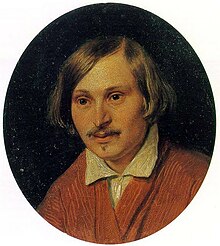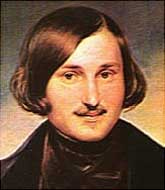Nikolai Gogol
Appearance
(Redirected from Nikolai Vasilievich Gogol)

Nikolai Vasilevich Gogol (Russian: Никола́й Васи́льевич Го́голь) (1 April 1809 – 4 March 1852) was a Ukrainian-born Russian writer, whose best known work is perhaps Dead Souls, seen by many as the first "modern" Russian novel.
Quotes
[edit]
- What a dreary world we live in, gentlemen.
- How the Two Ivans Quarrelled (1835)
- I am very fond of the modest manner of life of those solitary owners of remote villages, who in Little Russia are commonly called "old-fashioned," who are like tumbledown picturesque little houses, delightful in their simplicity and complete unlikeness to the new smooth buildings whose walls have not yet been discolored by the rain, whose roofs are not yet covered with green lichen, and whose porch does not display its bricks through the peeling stucco.
- "Old World Landowners" (1835)
- "Turn around, son! What a funny figure you are! Are those priests' cassocks you are wearing? And do they all go about like that at the academy?" With these words old Bulba greeted his two sons who had been studying at the Kiev college and had come home to their father.
- "Taras Bulba" (1835)
- And ruined is the Cossack! He is lost for all the chivalry of the Cossacks! He will see Zaporozhye no more; nor his father's farms, nor the church of God. Ukraine will see no more the bravest of the sons who undertook to defend her. Old Taras will tear the gray hair from his head and curse the day and hour when he begot such a son to shame him.
- "Taras Bulba" (1835)
- When the priest went in, he stopped short at the sight of this defamation of God's holy place, and dared not serve the requiem on such a spot. And so the church was left forever, with monsters stuck in the doors and windows, was overgrown with forest trees, roots, rough grass and wild thorns, and no one can now find the way to it.
- "Viy" (1835)
- In the course of reading he became more and more melancholy and finally became completely gloomy. When the reading was over he uttered in a voice full of sorrow: "Goodness, how sad is our Russia!"
- On Alexander Pushkin in Four Letters Concerning Dead Souls (1843)
- I shall laugh my bitter laugh.
- Epitaph on Gogol's tombstone
- ...it's not my job to preach a sermon. Art is anyhow a homily. My job is to speak in living images, not in arguments. I must exhibit life full-face, not discuss life.
- A letter to Zhukovsky, January 1848, quoted in Sculpting in Time (p49) by Andrei Tarkovsky
Diary of a Madman (1835)
[edit]
Note 1: The whole text of this short story the author attributes to Poprischin, a low-ranking civil servant gradually descending into madness.
Note 2: Quotes given as translated by Claud Field in The Mantle and Other Stories (1916 collection of Gogol's short stories)
- Dogs are clever fellows; they know all about politics [...]
- The year 2000: April 43rd.—To-day is a day of splendid triumph. Spain has a king; he has been found, and I am he.
- Marchember 86. Between day and night.
- No date. The day had no date.
- [P]eople think that the human brain is in the head. Nothing of the sort; it is carried by the wind from the Caspian Sea.
- To tell the truth, I often felt uneasy when I thought of the excessive brittleness and fragility of the moon. The moon is generally repaired in Hamburg, and very imperfectly. It is done by a lame cooper, an obvious blockhead who has no idea how to do it. He took waxed thread and olive-oil—hence that pungent smell over all the earth which compels people to hold their noses. And this makes the moon so fragile that no men can live on it, but only noses. Therefore we cannot see our noses, because they are on the moon.
- All the world knows that France sneezes when England takes a pinch of snuff.
- [Final lines] mother, mother, save your unhappy son! Let a tear fall on his aching head! See how they torture him! Press the poor orphan to your bosom! He has no rest in this world; they hunt him from place to place.
Mother, mother, have pity on your sick child! And do you know that the Bey of Algiers has a wart under his nose?
The Inspector General (1836)
[edit]
- It is no use to blame the looking glass if your face is awry.
- Epigraph
- Of course, Alexander the Great was a hero, but why smash the chairs?
- Epigraph; said of a history teacher who smashed a chair in his excitement when discussing the conqueror
- The more destruction there is everywhere, the more it shows the activity of town authorities.
- Act I, sc. i
- I tell everyone very plainly that I take bribes, but what kind of bribes? Why, greyhound puppies. That's a totally different matter.
- Act I, sc. i
- The sergeant's widow told you a lie when she said I flogged her. I never flogged her. She flogged herself.
- Act IV, sc. xv
- What are you laughing at? You are laughing at yourselves!
- Act V, sc. viii
Dead Souls (1842)
[edit]
- The gentleman lolling back in the chaise was neither dashingly handsome nor yet unbearably ugly, neither too stout nor yet too thin; it could not be claimed he was old but he was no stripling, either. His arrival in the town created no stir and was not marked by anything out of the ordinary.
- Chapter I
- [Women's] boarding schools, as we know, hold the three principal subjects which constitute the basis of human virtue to be the French language (a thing indispensable to the happiness of married life), piano-playing (a thing wherewith to beguile a husband’s leisure moments), and that particular department of housewifery which is comprised in the knitting of purses and other “surprises.” Nevertheless changes and improvements have begun to take place, since things now are governed more by the personal inclinations and idiosyncracies of the keepers of such establishments. For instance, in some seminaries the regimen places piano-playing first, and the French language second, and then the above department of housewifery; while in other seminaries the knitting of “surprises” heads the list, and then the French language, and then the playing of pianos—so diverse are the systems in force!
- Vol. 1, ch. 2
- As it is so strangely ordained in this world, what is amusing will turn into being gloomy, if you stand too long before it, and then God knows what ideas may not stray into the mind... Why is it that even in moments of unthinking, careless gaiety a different and strange mood comes upon one?
- Vol. I, ch. 3
- There are people who exist in this world not like entities but like the speckles or spots on something.
- Vol. I, ch. 5
- And for a long time yet, led by some wondrous power, I am fated to journey hand in hand with my strange heroes and to survey the surging immensity of life, to survey it through the laughter that all can see and through the tears unseen and unknown by anyone.
- Vol. I, ch. 7
- Oh troika, winged troika, tell me who invented you? Surely, nowhere but among a nimble nation could you have been born in a country which has taken itself in earnest and has evenly spread far and wide over half of the globe, so that once you start counting the milestones you may count on till a speckled haze dances before your eyes... Rus, are you not similar in your headlong motion to one of those nimble troikas that none can overtake? The flying road turns into smoke under you, bridges thunder and pass, all fall back and is left behind!... And what does this awesome motion mean? What is the passing strange steeds! Has the whirlwind a home in your manes?... Rus, whither are you speeding to? Answer me. No answer. The middle bell trills out in a dream its liquid soliloquy; the roaring air is torn to pieces and becomes wind; all things on earth fly by and other nations and states gaze askance as they step aside and give her the right of way.
- Vol. I, ch. 11
- Rus! Rus! I see you, from my lovely enchanted remoteness I see you: a country of dinginess, and bleakness and dispersal; no arrogant wonders of nature crowned by the arrogant wonders of art appear within you to delight or terrify the eyes... So what is the incomprehensible secret force driving me towards you? Why do I constantly hear the echo of your mournful song as it is carried from the sea through your entire expanse?... And since you are without end yourself, is it not within you that a boundless thought will be born?
- Vol. II, ch. 2
- Why are you being so stingy?", Sobakevich demanded. "It's cheap at the price. A rogue would cheat you, sell you some worthless rubbish instead of souls, but mine are as juicy as ripe nuts, all picked—they are all either craftsmen or sturdy peasants.
- there is no word so perk and quick, which bursts from the heart with such spontaneity, which seethes and bubbles with such vitality, as the aptly spoken Russian word
- Chapter V
- The reason why Proshka wore such large boots can be explained at once: Plyushkin kept only one pair of boots for all of his servants, however numerous they were, and they always stood in the hall.
- Chapter VI
- They insist that an author should write in the strictest, purest and noblest language: in short, they expect the Russian language to drop from the clouds, already refined, and that it should come naturally to the lips, so that all they have to do is to open their mouth and stick out their tongue. It goes without saying, of course, that the feminine half of the human species is very wise; but it must be confessed that our respected readers are even wiser.
- Apparently that does sometimes happen. Apparently even men like Chichikov are transformed into poets for a few moments in their lives: though the word "poet" would be an exaggeration here.
- Chapter VIII
- Among a number of intelligent suggestions there was finally this one too, strange as it may seem, that Chichikov might be Napoleon in disguise...
- Chapter X
- However, nothing turned out as Tchitchikoff had intended.
- Russia! Russia! I see you now, from my wondrous, beautiful past I behold you! How wretched, dispersed, and uncomfortable everything is about you...
- Russia, are you not speeding along like a fiery and matchless troika?
- Chapter XI
Quotes about Gogol
[edit]- Homeland, tenderer than first caresses,/you have taught me to protect and guard/golden language in all Pushkin's treasures,/Gogol's magic, captivating word.
- Margarita Aliger poem translated into English, anthologized in An Anthology of Jewish-Russian Literature edited by Maxim D. Shrayer (2007)
- I belong to the first generation of Latin American writers brought up reading other Latin American writers...Many Russian novelists influenced me as well: Dostoyevsky, Tolstoy, Chekhov, Nabokov, Gogol, and Bulgarov.


